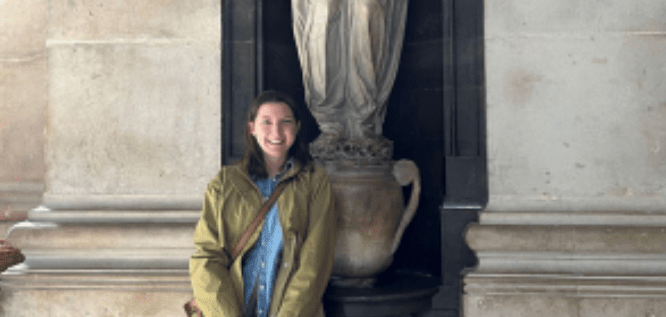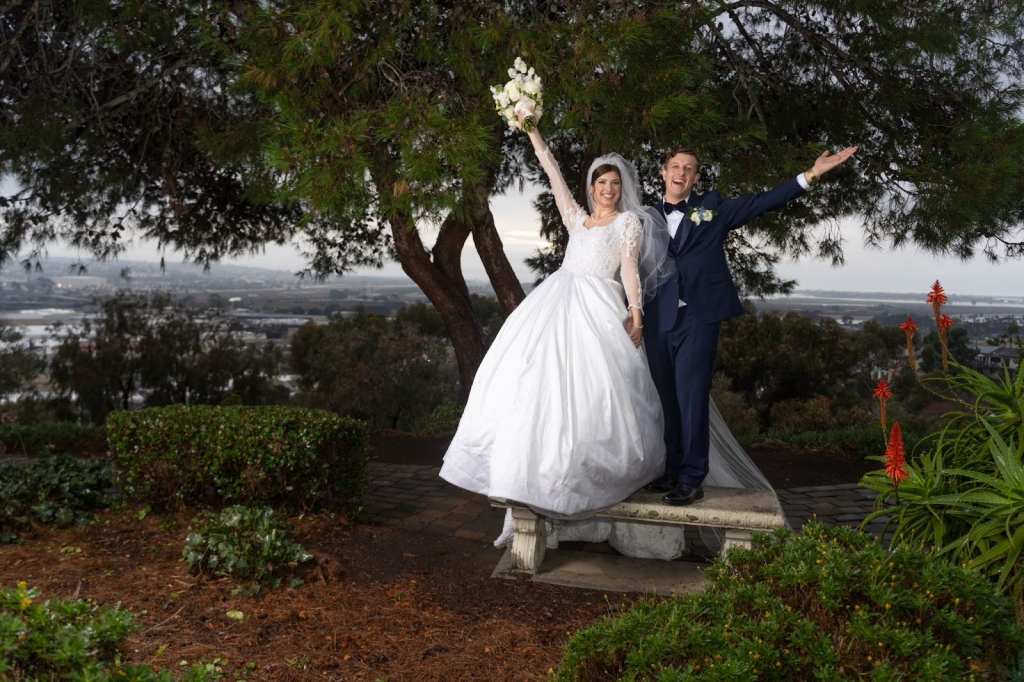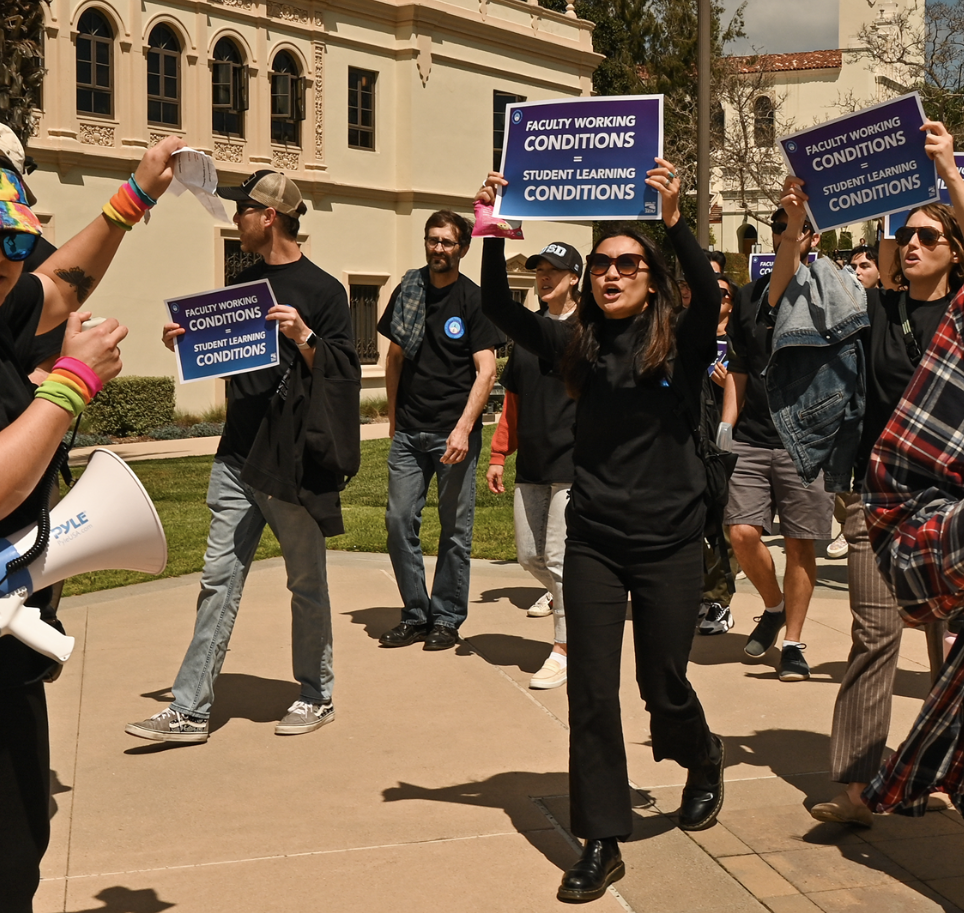JASON WU / CONTRIBUTOR
At USD, Dr. Sara Elizabeth Hasselbach is a proud and passionate professor in the English department and the director of the university’s Writing Center.
Professor Hasselbach was born amid a snowstorm in Atlanta, Georgia. Even though the circumstances of her birth were somewhat unsettling, Hasselbach found herself embraced by a caring family, which included her mother, father and older brother. The complexity of their family dynamics became a prominent theme throughout her life, especially as her family navigated divorce and remarriage. Following these changes, Professor Hasselbach was able to deepen a number of familial bonds.
When Hasselbach would feel overwhelmed or needed to vent out any negative energy, her mother was able to handle her emotions and help calm her down. Hasselbach also shared an incredible friendship with her cousin, Mary. Early on in their childhood, Hasselbach and Mary set the foundations for their friendship through handwritten letters. These letters, while having only simple questions, were simultaneously profound as they became the medium in which they understood each other more deeply.
“This was before the internet and you could tell that our parents were helping us write them, because we didn’t know how to do something like that. I still have hers, and they say things like ‘what bands do you like? I like The Fugees.’ Whenever she said something she liked or did, she would ask me about it. And it was just nice to have this correspondence,” Hasselbach remarked.
At every opportunity, Hasselbach and Mary would have discussions on artistic matters, whether it was novels, literary classics or theater productions. She specifically recalled a memory in which they had just finished watching Johnathan Larson’s rock musical, “Rent,” and afterward, ran around the city singing the production’s iconic songs. They were sure to have more memories like this, as they were constantly absorbed in each other’s company.
“It’s funny [because] my cousin and I, we often say we think we would be friends even without being family. No matter what, we would probably get along. But I guess you never know for sure because of all the invisible forces that influence our lives,” Hasselbach mused.
This sentiment held true, even as the currents of her life carried her from place to place. This was due to her father’s career as an airline mechanic — a job that required him to relocate twice. They moved to the cultural melting pot of Miami, where she attended Catholic school for primary education, and then to the serene beaches of Fort Lauderdale, where she completed high school.
With each introduction to a new environment, Hasselbach not only maintained her close relationship with Mary, but was also introduced to new cultures and people who helped broaden her worldview and embrace new perspectives. Eventually, Hasselbach’s journey led her to the heart of New York city where alongside Mary, she delved into the rich worlds of English and Italian literature at Barnard College.
“New York was a thrilling place to be in. It was really culturally diverse compared to places I had been before, so that was nice. The college, it’s a women’s college, so there was a lot of focus on gender equality issues, and that was refreshing to be around. [It was] a bunch of people who agreed it was an issue and acknowledged it. It was supportive and nurturing. I felt like I had the sisterhood and college experience I was always looking for,” Hasselbach reminisced.
After four years of hard work and receiving her Bachelor of Arts degree, Hasselbach’s career took an intriguing turn toward the realm of academic publishing. Her enduring passion for literature led her to the Modern Language Association (MLA), where she established friendships with her coworkers and delved into critical work on academic articles.
After her rewarding experience working at MLA, Hasselbach committed to becoming an English professor, driven not only by her passion for literature, but more specifically,her love of being part of the transformative process.
Currently, while working at USD, Hasselbach’s focus in teaching is to enhance student abilities in critical writing, close reading and appreciation for reading in general.
“I love helping students figure out ideas and how to read and how to connect with stories. And it’s so much about behavior and analyzing systems. Just helping students encounter those stories, help them see things differently, and open them to new perspectives. It’s really wonderful when you see them have their ‘eureka’ moment. I want students to eventually find the ideas themselves, by giving them the tools to do so,” Hasselbach said.
Besides her initial educational aspirations, Hasselbach was also given the opportunity to further spread her guidance at USD’s Writing Center. She has been its director for the past two years and in this role, she works with students to offer productive writing workshops. While Hasselbach has always had a love for literature, she understands that the disciplines of reading and writing are not necessarily attractive for everyone else, as some students find writing to be tedious and difficult. Professor Hasselbach, along with her staff, strive to change that notion through the resourcesoffered by their Writing Center.
“The whole point is to make students feel comfortable and navigate through that hierarchy, because they [the Writing Center staff] are experts in writing, but they don’t want students to feel like they are not on an evenplayingfield. That doesn’t mean they’ll just write your papers for you though — their job is to help you through the process so you can become an expert yourself. They’re peers. And they’re the kindest group of people,” Hasselbach shared.
In this capacity, through her combined position as a professor and provider of these writing services, Hasselbach has been able to integrate her goals of increasing students’ literary abilities and make it a more enjoyable experience. She has also become increasingly attached toward her job and the staff of the Writing Center, going as far as to call them her second family, while she makes it absolutely clear that she holds them to a high standard, adoring each of them for who they are.
“They are this amazing collection of people that are sensitive listeners and astute critical thinkers, and they care. I’m really lucky to have this position. I didn’t realize that there’s this whole part of my heart that opened to this other space — the Writing Center and these people. There’s really nothing that I want more. I think this is it, right here. I’m so happy here and I can’t imagine going somewhere else — getting this somewhere else and having these students somewhere else,” Hasselbach reflected.
Outside her found family at the university, Hasselbach is also fortunate to have her own created family. She has been married to her husband, Andrew Tirrell, for almost 13 years. Dr. Tirrell is also a professor at USD, who teaches courses in political science and is a pre-law advisor as well. Together, the couple navigate the world of parenthood, taking care of their son, who Hasselbach affectionately refers to as a “little monster.”
This blend of personal and professional fulfillment captures the essence of Hasselbach’s journey, revealing a life that has been filled with passion, purpose and human connections. She has found her calling in education, and through the bonds she has nurtured with colleagues and students alike, she continues to fall in love with her job every day.
Hasselbach stands next to the statue of John Donne, her favorite writer. Photo courtesy of Sara Hasselbach





Leave a comment